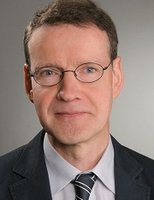Alexander Reinefeld
Home * People * Alexander Reinefeld

Alexander Reinefeld,
a German computer scientist, games researcher, and professor of Computer Science at the Zuse Institute Berlin (ZIB). He studied physics at the Technical University of Braunschweig and computer science at the University of Hamburg and during two one-year visits in Edmonton, at the University of Alberta. In 1982, he concluded his graduate in computer science and in 1987 he received his Ph.D at the University of Hamburg.
From 1983 to 1987, he worked as a scientific employee, and from 1989 to 1992 as assistant at the University of Hamburg. During the years 1987 to 1990 he collected industrial experience as a management consultant in the areas of Systems analysis, Databases and Compiler building. In 1992 Reinefeld collaborated with the Paderborn Center for Parallel Computing (PC²) at the Paderborn University [2]. Since 1998, Alexander Reinefeld leads the area of Computer Science in the Zuse Institute Berlin (ZIB). He is a member of the Gesellschaft für Informatik, the ACM, the IEEE Computer Society, the German university association Deutscher Hochschulverband (DHV) and Chair of Parallel and Distributed Systems at the Humboldt University of Berlin.
Contents
Chess Programs
Murks
In 1979 at the University of Hamburg, motivated and supported by his advisor Frieder Schwenkel, Alexander Reinefeld designed the chess program Murks, partly implemented in microcode for an Interdata M85 minicomputer.
Reinefeld: world chess champion Mikhail Botvinnik visited us and played against Murks.
MicroMurks
In 1980/81, a team of four students, Manfred Allers, Dirk Hauschildt, Dieter Steinwender and Alexander Reinefeld, ported Murks to a Motorola MC68000 Microprocessor, then dubbed MicroMurks. They built their own MC68000 microcomputer from scratch [3] Micromurks II represented by Dieter Steinwender, participated at the WMCCC 1983 in Budapest.
Search Algorithms
Negascout
In 1983 Alexander Reinefeld introduced the NegaScout search-algorithm, an improvement of Judea Pearl's Scout [4] .
RecSSS* and RecDual*
Ten years later, in 1993 at the 7th Advances in Computer Chess conference, Reinefeld made an attempt to resuscitate Stockman's SSS* algorithm, and proposed an improvement of the recursive RecSSS* [5] , initially developed by Subir Bhattacharya and Amitava Bagchi [6] . Despite promising results with some trees of depth 8, the space (memory) requirements were still very (too) high, and with the research of Aske Plaat, Wim Pijls and Arie de Bruin concerning Alpha-Beta with zero windows and transposition table in SSS* and Dual* as MT, SSS* was finally declared "dead" by Pijls and De Bruin in 1996 [7] .
Selected Publications
1982 ...
- Alexander Reinefeld (1982). Untersuchungen an modernen Suchbaum-Reduktionsverfahren. Diplomarbeit, Fachbereich Informatik, Universität Hamburg
- Alexander Reinefeld (1983). An Improvement to the Scout Tree-Search Algorithm. ICCA Journal, Vol. 6, No. 4, pdf
- Alexander Reinefeld (1985). Kai von Luck: Aspekte wissensgestützter Planung. Bernd Owsnicki: Repräsentation von positionellem Schachwissen mit Techniken der künstlichen Intelligenz. ICCA Journal, Vol. 8, No. 4
- Alexander Reinefeld, Tony Marsland, Jonathan Schaeffer (1985). Is Best First Search Really Best? Technical Report TR 85-16, Department of Computer Science, University of Alberta.
- Alexander Reinefeld, Jonathan Schaeffer, Tony Marsland (1985). Information Acquisition in Minimal Window Search. Proceedings of the 9th IJCAI, pp. 1040-1043.
- Alexander Reinefeld, Tony Marsland (1987). A Quantitative Analysis of Minimal Window Search. IJCAI-87, pdf
- Tony Marsland, Alexander Reinefeld, Jonathan Schaeffer (1987). Low Overhead Alternatives to SSS*. Artificial Intelligence, Vol. 31, No. 2, pp. 185-199. ISSN 0004-3702.
- Alexander Reinefeld (1989). Spielbaum Suchverfahren. Informatik-Fachberichte Volume 200. Springer-Verlag, Berlin, Germany. ISBN 3-540-50742-6.
1990 ...
- Alexander Reinefeld (1994). A Minimax Algorithm Faster than Alpha-Beta. Advances in Computer Chess 7
- Alexander Reinefeld, Tony Marsland (1994). Enhanced Iterative-Deepening Search. IEEE Transactions on Pattern Analysis and Machine Intelligence, Vol. 16, No. 7, pp. 701-710. ISSN 0162-8828. pdf
- Alexander Reinefeld, Peter Ridinger (1994). Time-Efficient State Space Search. Artificial Intelligence, Vol. 71, No. 2, CiteSeerX
2000 ...
- Alexander Reinefeld (2000). Parallel Heuristic Search and Heuristic Search. In: C.A. Floudas, P.M. Pardalos (eds.), Encyclopedia of Optimization. Kluwer Academic Publishers
- Florian Schintke, Jens Simon, Alexander Reinefeld (2001). A Cache Simulator for Shared Memory Systems. International Conference on Computational Science ICCS 2001, San Francisco, CA, Springer LNCS 2074, vol. 2, pp. 569-578.
- Alexander Reinefeld (2005). Die Entwicklung der Spielprogrammierung: Von John von Neumann bis zu den hochparallelen Schachmaschinen. slides as pdf, Themen der Informatik im historischen Kontext Ringvorlesung an der HU Berlin, 02.06.2005 (English paper, German title)
- Alexander Reinefeld (2009). Heuristic Search. In: C.A. Floudas, P.M. Pardalos (eds.), Encyclopedia of Optimization 2nd ed. pp 1506-1508
- Alexander Reinefeld (2009). Parallel Heuristic Search. In: C.A. Floudas, P.M. Pardalos (eds.), Encyclopedia of Optimization 2nd ed. pp 2908-2912
External Links
- Alexander Reinefeld from Wikipedia
- Alexander Reinefeld's homepage
- Ein neues Netz, das Petabytes zerlegen kann Golem.de (German)
- 2nd Doctoral Workshop on Mathematical and Engineering Methods in Computer Science - Invited Talks, Memics October 28, 2006, in Mikulov, Czech Republic, Photogallery 2nd day
- Device and Method for Storing / Retrieving Objects with Multidimensionally Addressed Electronic Data - Patent application
References
- ↑ Alexander Reinefeld's homepage
- ↑ Paderborn Center for Parallel Computing
- ↑ Alexander Reinefeld (2005). Die Entwicklung der Spielprogrammierung: Von John von Neumann bis zu den hochparallelen Schachmaschinen. slides as pdf, Themen der Informatik im historischen Kontext Ringvorlesung an der HU Berlin, 02.06.2005 (English paper, German title)
- ↑ Alexander Reinefeld (1983). An Improvement to the Scout Tree-Search Algorithm. ICCA Journal, Vol. 6, No. 4, pdf
- ↑ Alexander Reinefeld (1994). A Minimax Algorithm Faster than Alpha-Beta. Advances in Computer Chess 7
- ↑ Subir Bhattacharya, Amitava Bagchi (1990). Unified Recursive Schemes for Search in Game Trees. Technical Report WPS-144, Indian Institute of Management, Calcutta
- ↑ Arie de Bruin, Wim Pijls (1997). SSS†. Advances in Computer Chess 8
- ↑ dblp: Alexander Reinefeld
- ↑ ICGA Reference Database (pdf)